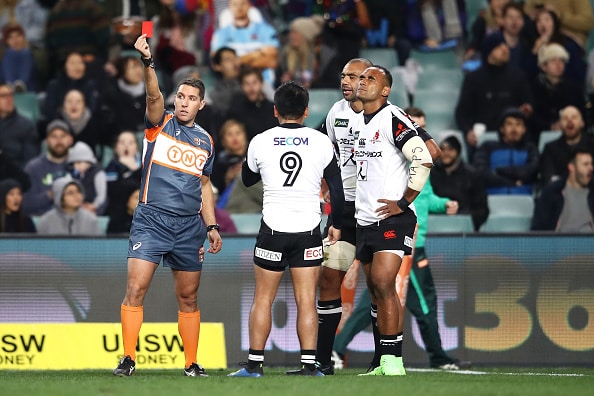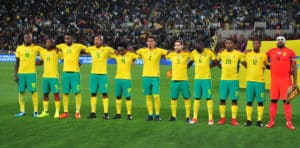The desire from officials to prioritise player safety should be commended, but it should not come at the expense of common sense, writes CRAIG LEWIS.
Another weekend of rugby, another bizarre decision from officials. For two weeks in a row, the struggling Sunwolves must wonder what they have done to anger the rugby gods.
It began with Semisi Masirewa receiving an undeniably harsh red card against the Waratahs, while this past weekend, flanker Ed Quirk was also sent from the field for what was deemed to be a ‘punch’, but in fact looked like nothing more than a harmless scuffle.
WATCH: Sunwolves flank red-carded
These incidents all come after the vagaries of the June Tests, where inconsistent officiating blighted the series between the All Blacks and France, while Wallabes coach Michael Cheika was left fuming when Israel Folau was sin binned in the final Test against Ireland for a fairly innocuous mid-air challenge.
It’s all served to raise some very serious question marks about whether the game is becoming a bit soft, and over the role of the officials in what is becoming a stop-start affair.
To be clear, it has to be commended that officials are adopting a zero-tolerance stance to any contact that endangers a player’s safety, but it’s all gone a little too far.
At the conclusion of the All Blacks’ June Test series, coach Steve Hansen was spot on when he reiterated that officials and World Rugby administrators needed to appreciate that not everything in the game was going to be so ‘clear and obvious’.
‘It’s a fluid game which is going to have grey patches and you can’t rule on it as if it is black and white. It’s about intention and it’s pretty obvious when someone intends to hurt someone and it’s pretty obvious when they don’t. That’s my opinion. They [World Rugby] may see it differently. While we’re busy trying to eradicate concussions and stuff we’ve also got to acknowledge that it’s a contact sport and there’s going to be the odd accident.’
Quite right. Do we really want to see a situation where players are coached to avoid competing for possession during a contestable kick? Unfortunately, that’s becoming an increasing possibility with the reward no longer worth the risk of potentially making contact with a player in the air.
It’s also pervading into other areas of the game, where big tackles are starting to land players in hot water as the lines become blurred over what’s dangerous and what’s not.
Former All Blacks enforcer Brad Thorn, who is now the coach of the Reds, summed it up quite aptly following the red card dished out to Quirk this past weekend: ‘Red cards are [supposed to be] for horrendous spear tackles, someone kicking someone on the ground, eye gouging horrendously or something – not love taps.’
The role, relationship and communication between the referee and Television Match Official has also become about as clear as mud.
Just as the VAR (video assistant referee) system courted controversy throughout the recently-concluded Soccer World Cup, it’s very evident that the interjection of an official sitting behind a TV set is not always the answer.
Far too often this season, Super Rugby matches have endured lengthy stoppages as referees receive the ‘check check’ call in their ear, or while waiting for TMOs to pore over multiple replays.
On Monday, Sanzaar issued a statement to admit that there were some ‘challenges’ in the officiating process that needed to be addressed, while specifically acknowledging that the TMO protocols were not working.
READ: ‘TMO protocols not working’
It’s all become a bit messy, with Sanzaar quite rightly highlighting that the on-field referee needs to remain the key decision-maker on the field. Indeed, it’s all too often that the TMO appears to be casting seeds of doubt or persuasion in the mind of the man in the middle.
In the midst of all the chaos, match officials would also do well to recognise the qualities that have seen Nigel Owens rise to be widely regarded as the best referee in the world.
The Welshman is clear in his decision-making and has the balls to back his own instincts. More often than not, he tells the TMO what he has seen, and wastes little time in waiting for any rebuttal.
Perhaps more importantly, though, he sees the game for what it is: a contact sport. By treating players as people, Owens allows for some wiggle room when it comes to ruling on whether there was any intent or malice, but also has no problem calling players in to line when necessary.
More officials, like Owens, need to have courage in their convictions, while accepting that this is a game where there are shades of grey, and one that should not become overly sanitised.
Photo: Mark Kolbe/Getty Images





